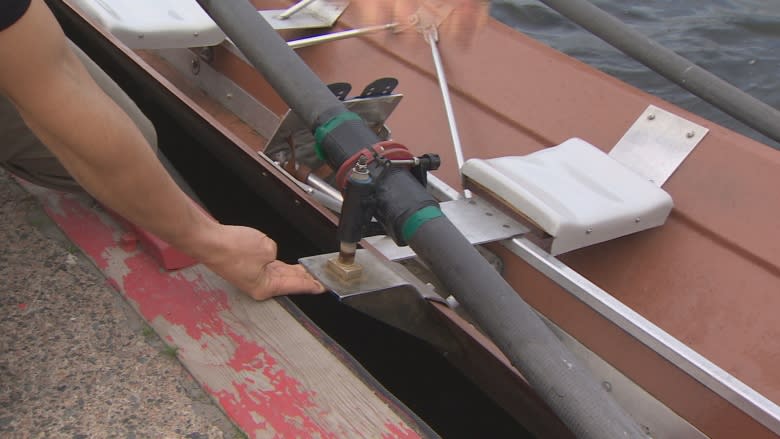Lose the lube: Rowers say rigid rules at Royal St. John's Regatta unfair
A group of rowers says the committee in charge of the Royal St. John's Regatta is enforcing unnecessary rules which limit the potential to win races and break records.
Members of the Outer Cove and M5 rowing teams are upset with how the regatta organizing committee can make and change rules without consulting rowers or experts.
No crew can use Jig-A-Loo
One ruling is that rowers can no longer put a lubricant called Jig-A-Loo on the seats of their boats, also called shells, to allow the rowers to slide back and forth more easily.
Unlike many other North American races, the Royal St. John's Regatta uses fixed-seat boats. That means the seats do not move, which is why the teams like to use lubricant to allow them to slide as they row.
The committee says it's an oil-based product that could damage the seats.
Unconvinced, rowers on the Outer Cove team talked to the person who designed the standardized seats, only to be told they are made with a fibreglass gel coat.
"He said there's nothing that will harm those seats. Absolutely nothing. They're rock hard, nothing will leach in," said Mark Hayward, the coxswain for the Outer Cove men's crew.
Not petroleum-based
The rowers also contacted the company that makes Jig-A-Loo, which said the lube is not petroleum-based, and the company may take legal action against the regatta committee.
"They were not happy with this at all. They said to us, and this is an exact quote, 'It sounds like someone is trying to slow you down,'" Hayward said.
"They actually said they were going to talk to their legal team about slander. Because they were actually losing money from crews that could be using this."
Adjustment of oar locks
Another rule the rowers feel is too rigid is the fact that they can no longer adjust the height of the oar locks, which M5 crew member Katie Wadden said puts women and smaller rowers at a major disadvantage.
She said previously rowers would use adjustable washers, which allowed them to modify the oar locks for the height of each person.
But the committee says those washers can't be used.
"It's kind of like the Tely 10. You wouldn't get everybody running in size 10 shoes," Wadden said.
"It's very biomechanically inefficient. So now we're pulling in extremely high in order to row these huge racing shells that are currently set for men."
Wadden said 82 per cent of rowers in the 2016 Regatta were women and the committee's rules will have detrimental consequences on the races.
Rowers feel shut out of decision process
The rowers said the rules about lubrication and oar lock adjustment are part of a bigger issue — the committee not listening to the teams that actually make the Regatta a success year after year.
Wadden said three engineers that row on her team wrote a formal letter to the rules committee, explaining why they should be able to use the lubricant and adjust the locks, laying out their argument with evidence-based research.
"We sent it to the committee, and now there's a new rule that we're not allowed to changed the height of the clips," she said. "There's a lot of traditionalists on the committee, and sometimes I think they feel that we're trying to make the boats slide-seat boats."
Bert Hickey, who coaches the Outer Cove crew, agrees. He said the issues around the rules goes beyond just the Outer Cove and M5 teams, and affects everyone who rows in the Regatta.
He said the rowers who want the changes know the sport, and what works and what doesn't. He said the strict rules are creating needless obstacles which will prevent rowers from hitting their best times and breaking records.
With participants paying close to $350,000 in registration fees over the last five years, Hickey said it's unacceptable that they have so little influence on decisions.
"The rules that they're coming in with is setting this sport back 20-25 years," he said. "The time has come now when participants deserve a voice on that committee when it comes to making changes."
All about standardization, says committee
In a statement to CBC, the regatta committee said the rules around equipment have to do with ensuring standardization of seats and shells for all rowers. It said the committee remains open to suggestions in the future but the rules will not change for this year's event.
"These improvements were intended to make the sport accessible to all ages and abilities, especially young children," wrote committee vice-president Chris Neary.
"While we appreciate the comments made by Mr. Hayward, rest assured much consideration and research went into our recent rulings he references. Our decisions were made with the rowers and protection of our equipment in mind."








